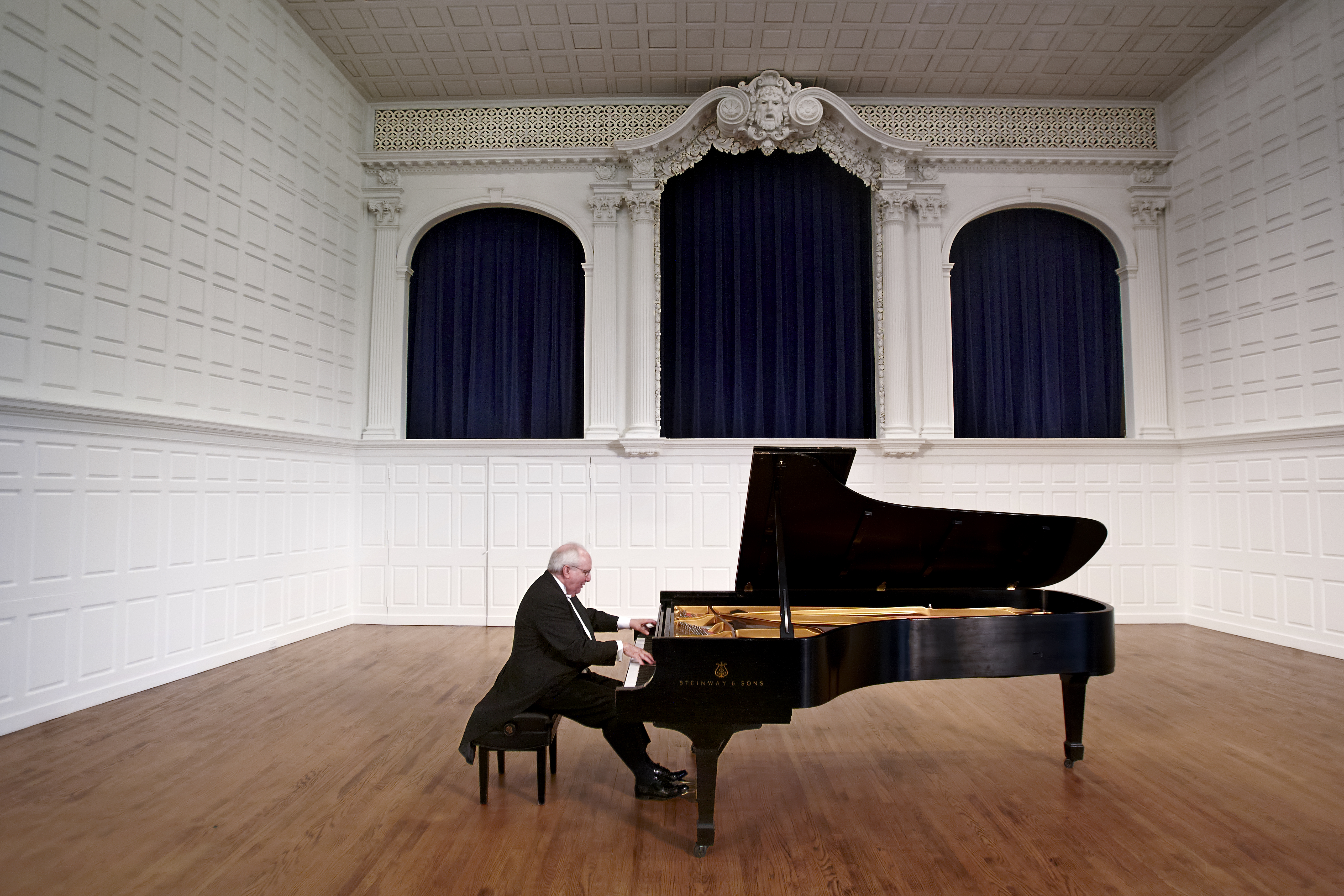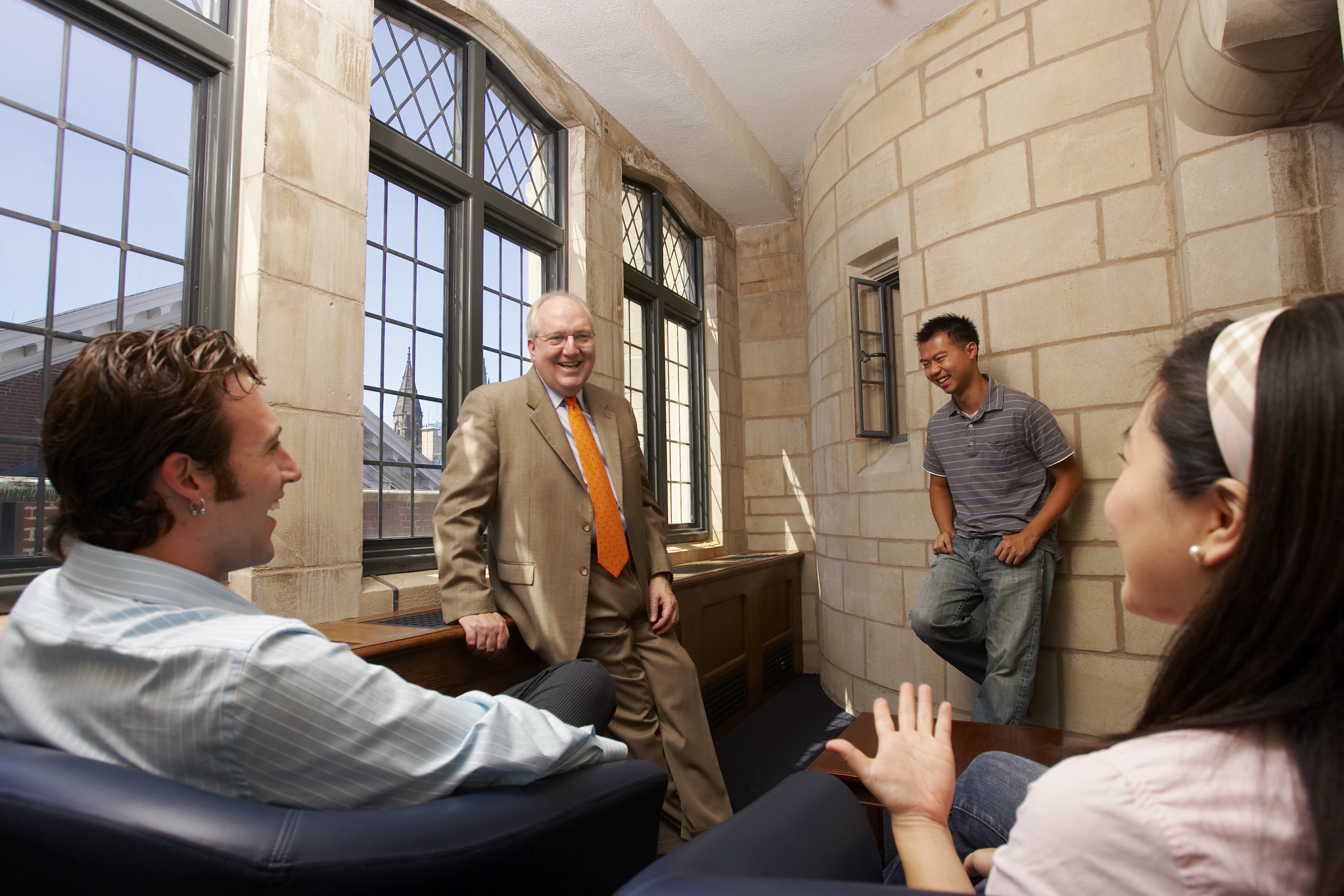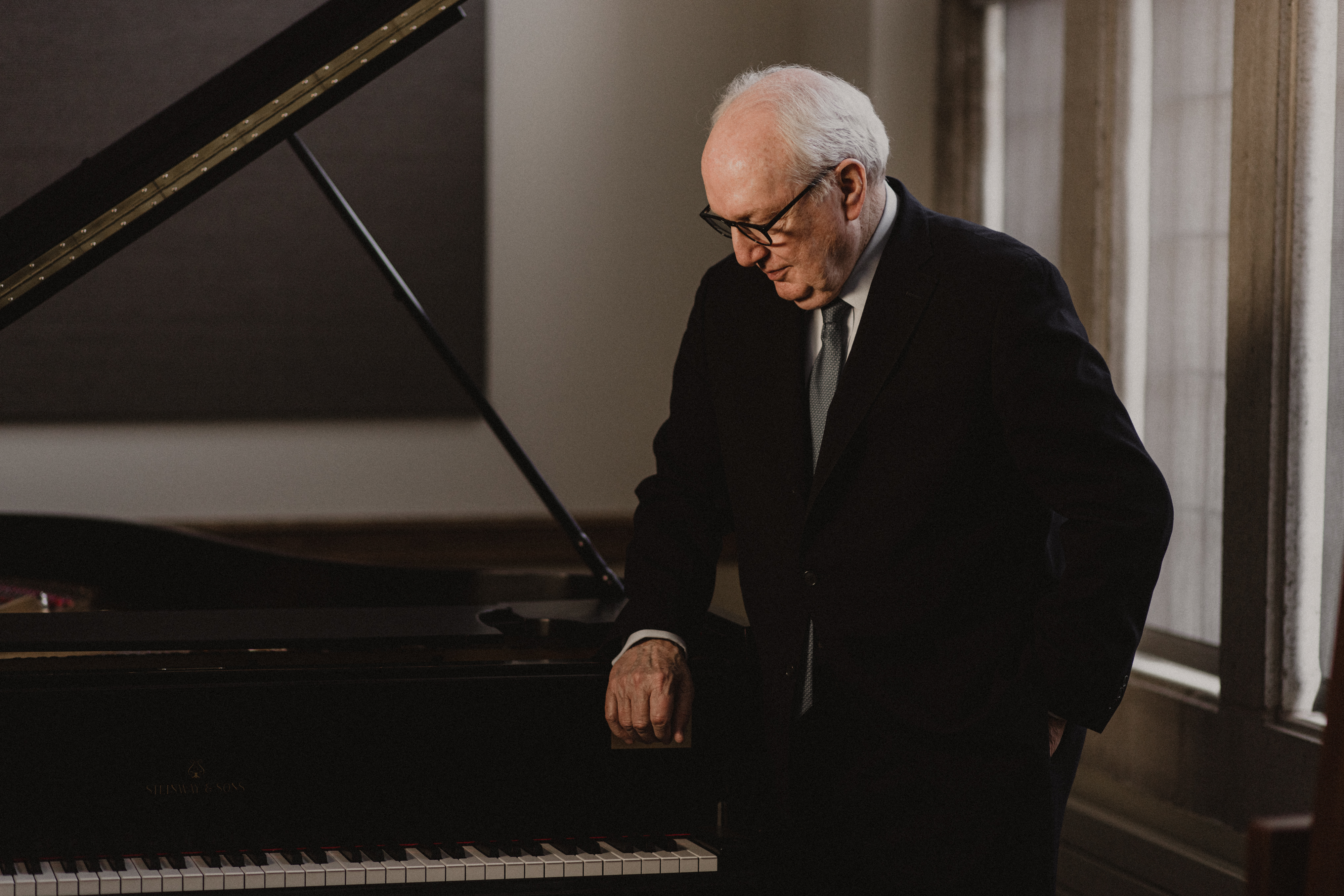Blocker leaves legacy of transformative leadership
Outside Leigh Hall, one can hear music—the sounds of pianists at the keyboard, violinists drawing bows against strings, chamber groups rehearsing intricately woven passages. Sometimes it is Dean Robert Blocker at the Steinway in his office, reading through a work in preparation for an upcoming performance or tapping into the magic of Mozart between meetings. More than once, Blocker has remarked to a colleague in the hallway, “You know, I must have the best job in the world,” situated as he has been in that office, at this School and University, for nearly three decades, learning each and every day about the art form from faculty and students alike, from guest artists, from the new repertoire that is imagined and created in the studios, classrooms, and concert venues that hold the echoes of performance and expression.
As he prepares to retire after twenty-eight years as Dean, Blocker, who will remain on the School’s faculty, can follow the thread of his good professional fortune back to childhood, to the piano, and to the vocal works of Bach he sang in grade school and church, finding, in melody, harmony, and rhythm, a prescription for hope and wonder. Indeed—first, for Blocker, there was music. Ask him about this place and he will tell you it is about people and the art form to which each of us should have access as a birthright. He will tell you that what we do, as artists, can help heal our fractured world. It is that high-minded reverence for music-making and its power that has imbued Blocker’s leadership and a career at Yale that has been transformative for the School, the University, the City of New Haven, and the world.

Deanship redefined
When he arrived at Yale in 1995, Blocker brought with him a vision, a conception of what the School of Music ought to look and sound like, ought to represent, given its place on this storied campus. He had a long-term strategic plan and the knowledge and expertise to reimagine an institution whose work it is to prepare the most exceptional, ascendant young musicians for service to the profession and to society, as the School’s mission stipulates. That would take more than wonder and hope. It would take support, and, most important, it would take people who shared with the School’s founders the belief that music deserves a place in the curriculum of a university of Yale’s reputation. Blocker came to Yale with an impressive history of building programs. He had served with distinction as the founding Dean of the School of the Arts and Architecture at UCLA, and as Dean at the University of North Texas College of Music and the School of Music at Baylor University.
Blocker was familiar with the Yale School of Music’s legacy. There were and had always been remarkable performers and composers here—faculty, students, and academic pedagogues, alike. What was needed in the mid-1990s were the building blocks that could propel the School into the twenty-first century—scholarships and major facilities improvements, a faculty whom, along with current students and alumni, constituted a community that gave music at Yale tangible meaning, a curriculum and programming befitting of the lone graduate-professional music school in the whole of the Ivy League. Blocker’s successful efforts to secure an extraordinary $100 million gift in 2005 enabled the School to offer full scholarships to all students in perpetuity, which in turn helped the School attract the most sought-after graduate students and young artists in the world.
Investment in existing programs including the Yale Summer School of Music/Norfolk Chamber Music Festival and Morris Steinert Collection of Musical Instruments were vital, as were those that would provide faculty and staff with state-of-the-art spaces in which to work, whether reimagined or renovated or built anew, expanding the School's campus at the heart of the University. Sprague Memorial Hall, whose construction in 1917 had been made possible by one of the most important cultural philanthropists of her time, was remade—its concert venue, Morse Recital Hall, an acoustic and aesthetic marvel. Leigh Hall, once the University’s health-care center, was repurposed, as was Hendrie Hall, Yale’s former Law School building, in a project that yielded the Adams Center for Musical Arts, which connected Leigh Hall and Hendrie Hall, offered students and faculty a towering new orchestral rehearsal hall, classrooms, and additional practice spaces, and, for the first time, provided spaces for School of Music students to interact with their counterparts from Yale College’s Department of Music. Every element of the School’s remarkable growth has been made possible by Blocker’s extraordinary fundraising acumen, his ability to convey to potential supporters the importance and value of the School’s work and to interest those potential supporters in sustaining the School’s mission through timely and generous gifts. Investment in the School’s work in the community was also made, thanks in large part to the relationships Blocker forged and the critical funding he secured through collaboration with the Yale College Class of 1957. Just as he has described himself as the most fortunate person in the world for having the opportunity to regularly hear world-class artists in rehearsal and performance, Blocker has frequently pointed out that performances by students from the New Haven Public Schools who participate in YSM’s Music in Schools Initiative are among the most meaningful he has attended during his time at Yale.
Community cultivated
Tradition, Blocker knew, would help draw a far-flung community together. With Commencement exercises marking the transition from one academic year to the next, he established an annual Convocation in September during which the incoming class is formally installed in a ceremony marked by performances by faculty, alumni, and current students. Also added to the traditions the YSM community maintains today were the singing of Schubert’s An die Musik at Convocation and Commencement, a popular, year-ending Honors Banquet, where excellence awards are presented to students and faculty, and the establishment of prizes created to acknowledge the extraordinary achievements of the artists who have called this special place home and the staff who have been charged with its operations.
As much as Blocker understood the value of community here in New Haven, he has also long appreciated YSM’s international reach. Thousands of alumni live and work in cities around the world, cities whose populations value music and its place in our global society. Blocker’s work in China alone has made the world a bit smaller. In addition to entering into several strategic agreements with cultural institutions across China, Blocker and Wang Cizaho, then President of the Central Conservatory of Music in Beijing, organized “Musicathlon: The Conservatory Music Festival,” in which students and faculty from music schools and conservatories from around the world gathered for performances before the Games of the XXIX Olympiad, and which brought the Yale Philharmonia to Asia for performances in Beijing, Shanghai, and Seoul.
Locally, Blocker’s longtime presence on the Yale campus and in New Haven has positioned the School of Music as a cultural resource, a destination for concertgoers from Greater New Haven and beyond, and, as former Yale President Richard Levin has said, “the soul of the University.” The School’s place at Yale, in New Haven, and on the world stage, was at the heart of the community’s 2019 celebration of the 125th anniversary of the School’s establishment.

Crises faced
If there has been one monumental project Blocker could not foresee embarking on it was keeping the work of the School going during the COVID-19 pandemic. The Yale Philharmonia was set to begin a tour to Boston, New York, and Washington, D.C., when the world shut down. Following guidance from the University and the Centers for Disease Control and Prevention, Blocker and his administration, almost overnight, had the School of Music operating virtually to the fullest extent that could be accomplished given the nature of music study and performance. For two years, during which work was accomplished mostly online, the YSM community came together in ways that reflected the cultural leadership Blocker spent his deanship championing. Students, alumni, and faculty created videos in their homes that the School shared widely, while some curated video playlists for patients and caregivers in area hospitals. Others, led by faculty, gave concerts in the parking lot behind the Adams Center. Slowly, as the coronavirus was understood, the YSM community began to return for safely conducted in-person performance activities. Eventually, the YSM community returned in full to campus, eager to welcome audiences and to take the stage in Morse Recital Hall and Woolsey Hall to do what they came here to do.
The community that returned was one that had learned much about itself during months of isolation and lockdown. Just as the pandemic reminded the world that unexpected tragedy could arrive out of the blue, on a massive scale, events during that same period forced us all to face anew an ever-unfolding atrocity. The murder of George Floyd in May 2020, an act of violence that brought an outraged many into the streets to protest the systemic and structural racism that have always pervaded our society, expedited the hiring of YSM’s inaugural Director of Equity, Belonging, and Student Life and placed a School-wide focus on the relative lack of diversity in classical music. Coming out of the pandemic, Blocker sought anew to train a focus on an early YSM alum, pianist, and composer—Helen Hagan, whose Piano Concerto in C minor was given its world-orchestral premiere 110 years after Hagan composed the work and performed it, with an ensemble of her peers, on the same stage.
The final year
In September 2022, Yale University President Peter Salovey announced Blocker’s intention to retire, after twenty-eight years in the Dean’s Office at YSM, in August 2023. In the final years of his tenure, Blocker had opportunities to appoint more distinguished artists to YSM’s impressive faculty. Major renovation projects were ongoing at the Norfolk Festival and at the Steinert Collection of Musical Instruments, and a search was launched to identify Blocker’s successor. A send-off event for Blocker was held in April. As he prepared to step away from the Dean’s Office and to occupy a teaching studio in Leigh Hall, Blocker reflected on nearly thirty years of work and leadership at Yale and the people and music that have surrounded and nourished him. To ask him in a private moment each year how he felt his performance on the Horowitz Recital Series had gone would elicit the same response: “Better than it could have, not as well as it should have”—in that, a healthy measure of modesty. While he has always performed here at Yale and beyond, Blocker has not, perhaps since his earliest days at the keyboard, had anything to prove to anyone. He plays because he needs to, needs the nourishment of the music itself, whether it is a work by Bach, Mozart, or a faculty composer, and wants very much for whomever might be in the audience—whether in Morse Recital Hall or some other venue halfway around the world—to experience the wonder that he did as a child and still does.
This article was published in the Fall 2022/Spring 2023 issue of Music at Yale.






